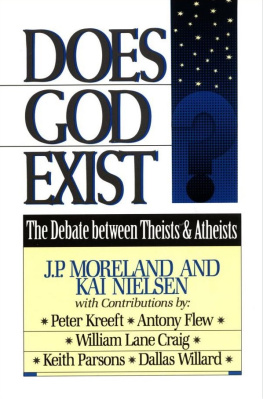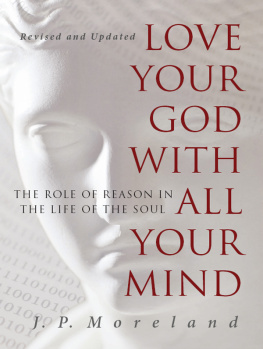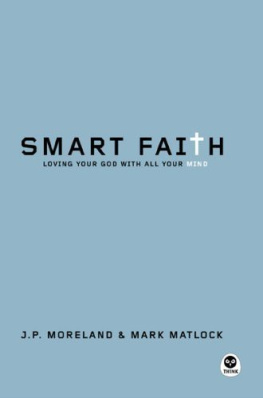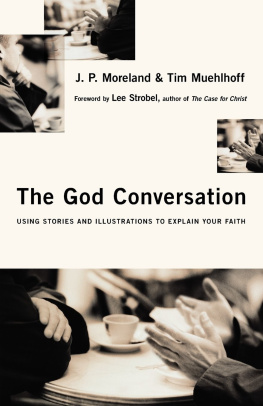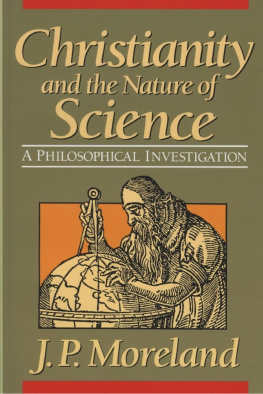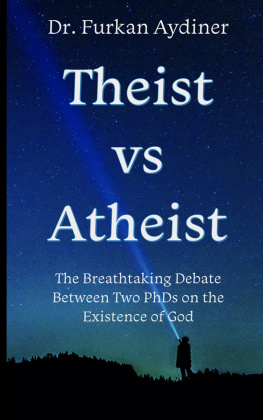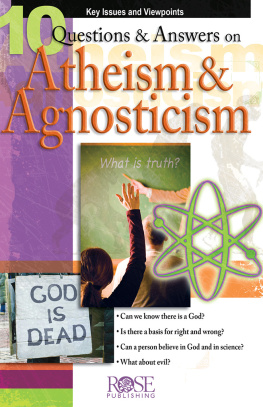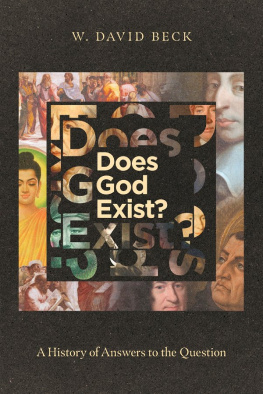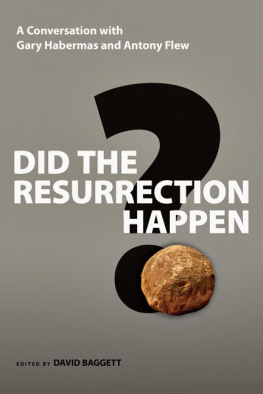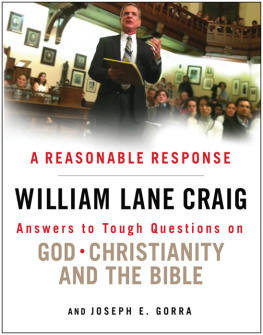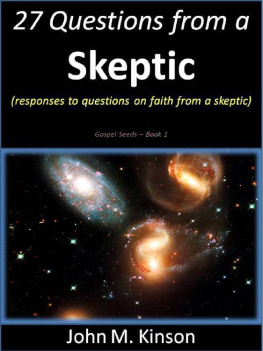J. P. MORELAND AND KAI NIELSEN




To the staff of Campus Crusade for Christ
J. P. Moreland
To Merlette Schnell
Kai Nielsen
CONTENTS
Peter Kreeft
PART I
Does God Exist? The Formal Debate
J. P. Moreland
Kai Nielsen
J. P. Moreland
Kai Nielsen
Kai Nielsen
J. P. Moreland
J. P. Moreland and Kai Nielsen
PART II
Does It Matter That God Exists? The Debate Continued
Kai Nielsen
J. P. Moreland
J. P. Moreland and Kai Nielsen
PART III
What Do Others Think? Responses to the Debate
William Lane Craig
Antony Flew
Keith Parsons
Dallas Willard
PART IV
What Would the Debaters Say? Some Closing Arguments
J. P. Moreland
Kai Nielsen
PART V
How Can I Decide for Myself? The Debate Made Personal
Peter Kreeft
Peter Kreeft
Atheism Christian Theism
PREFACE
Professors J. P. Moreland (theist) and Kai Nielsen (atheist) went headto-head over the question "Does God exist?" at the University of Mississippi on the evening of March 24, 1988. At the end of their formal presentations, rebuttals, and counter-rebuttals, they answered questions from the almost eight-hundred member audience. That evening's interchange comprises PartI of this book.
On that same day, before they met to debate God's existence, Moreland and Nielsen lectured and answered questions on whether or not ethics depend on God-on either His will or His nature or both. In other words, what role, if any, should the existence of God play in our day-to-day decisions of what's right and what's wrong? Can we be moral without God? Must ethical standards be grounded in God for them to be truly ethical or truly standards? Our debaters' presentations of their positions on this issue make up Part II.
After their debate on God's existence and presentations on ethics were transcribed, they were given to two theists and two atheists for their responses (Part III). With the respondents' essays in hand, Moreland and Nielsen wrote their closing arguments, making their final responses to each other and to the respondents (Part IV).
Opening and concluding the book are contributions by philosopher and author Peter Kreeft. And for those who wish to dig deeper into the issues raised by the debaters, Professor Kreeft has provided an appendix, "Facing the Specific Questions."
Finally, a bibliography on atheism (compiled by Nielsen) and Christian theism (compiled by Moreland) wraps up this volume.
The desire behind this book's undertaking was to bring to your attention many of the critical and life-changing issues that surround the question of the existence of God. We hope you will weigh the "pros" and "cons" carefully and rationally. Then make a decision-to choose a position or engage in more reflection and study. But whatever you do, we hope you don't put the matter aside and press on with your life. This question is too great, too fundamental, too all-impacting to set aside. Indeed, to ignore it is to decide-to decide how you will think and live. So read on, consider, decide.
William D. Watkins
Editor
INTRODUCTION
Peter Kreeft
Why Debate the Existence of God?
The Primacy of the Question
The idea of God is either a fact, like sand, or a fantasy, like Santa.
If it is a fantasy, a human invention, it is the greatest invention in all of human history. Measure it against all the other inventions, mental or physical. Put on one side of the scale the control of fire, the domestication of animals, and the cultivation of wheat; the wheel, the ship, and the rocket ship; baseball, the symphony orchestra, and anestheticsand a million other similarly great and wonderful things. Then put on the other side of the scale a single idea: the idea of a being that is actual, absolute, perfect, eternal, one, and personal; all-knowing, all-loving, all-just, all-merciful, and all-powerful; undying, impervious, unbribe- able, uncompromising, and unchangeable; a cosmic creator, designer, redeemer, and provider; cosmic artist, musician, scientist, and sage; the infinite abyss of pure Being who is yet a person, a self, an "I. " It is disputable whether such a being is a fact or a fantasy, but it is indisputable that if it is a fantasy, it is by far the greatest fantasy in history. If it is humanity's invention, it is humanity's masterpiece.
The idea of God has guided or deluded more lives, changed more history, inspired more music and poetry and philosophy than anything else, real or imagined. It has made more of a difference to human life on this planet, both individually and collectively, than anything else ever has. To see this clearly for yourself, just try this thought experiment: suppose no one in history had ever conceived the idea of God. Now, rewrite history following that premise. The task daunts and staggers the imagination. From the earliest human remains-religious funeral artifacts-to the most recent wars in the Mideast, religion-belief in a God or gods-has been the mainspring of the whole watch that is human history. -- - - - -- -- - - - - - --
The debate recorded in this book was designed to aid anyone who wishes to investigate the question whether God is the greatest of fantasies or the greatest of facts. Those are the only two possibilities. "To be or not to be, that is the question." There are endless variations and refinements within the concept of the nature of God, but the Law of Excluded Middle prevents any compromise on the question of God's existence.
Why are we reluctant to admit this eminently logical truism with respect to God, though not with respect to anything else? Because it means that one of the two sides, either the believers or the unbelievers, have been basing their entire lives on the most fundamental illusion that has ever bedeviled humanity. Sigmund Freud's argument, though often shocking to believers, is consistently logical: If religion is an illusion, it is the greatest of all illusions, in fact, a species of collective insanity, like the imaginary friend of a child who never grew up. The same is true, of course, about atheism if theism is true: It is the child's denial of the parent's existence.

